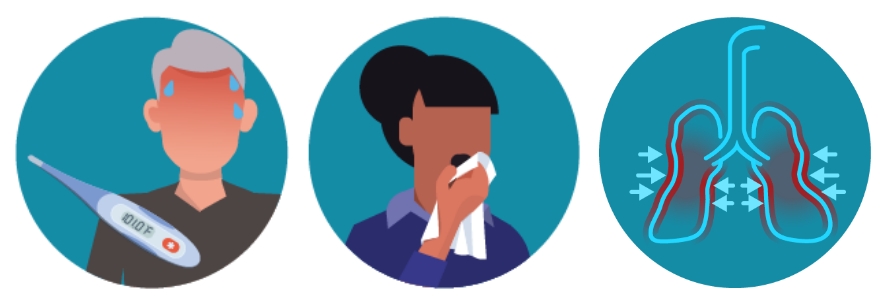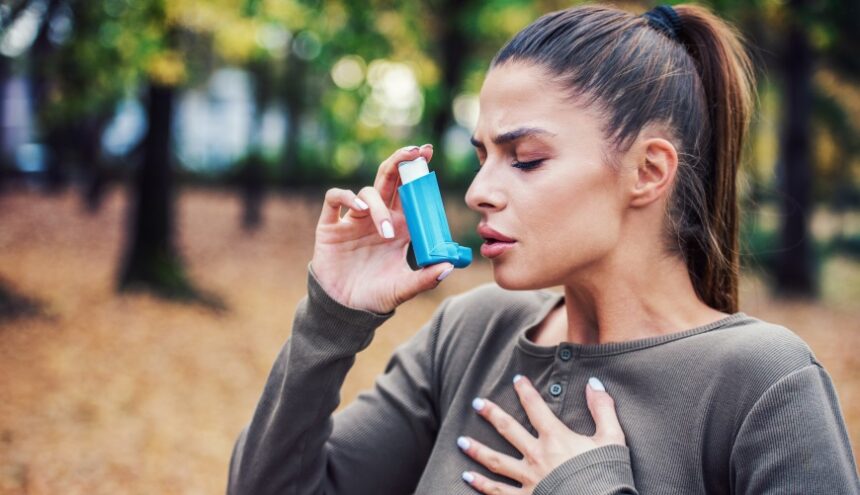11 Frequently Asked Questions for Anyone with Asthma or a Chronic Respiratory Illness
Does having asthma put me at a higher risk of being infected with the new coronavirus and contracting COVID-19?
No. Having asthma or other chronic lung disease does not increase your risk of getting COVID-19 any more than influenza or other disease. Your risk of complications from COVID-19 are higher with asthma.
What are the complications people with asthma may face if they get COVID-19?
Because people with asthma already have a degree of inflammation in their airways, additional inflammation makes a person more reactive to triggers such as inhaled allergens, air temperature changes, and infections like COVID-19. So if a person with asthma is infected with the coronavirus, it will feel like a worsening of their asthma symptoms – chest tightness, wheezing, shortness of breath, and the need to use asthma relief medications.
Does having severe asthma put me at a higher risk for COVID-19?
This depends on how well your asthma is already controlled. People with moderate to severe asthma may be at higher risk of getting very sick from COVID-19 because it can affect the respiratory tract. It can possibly lead to pneumonia and acute respiratory disease.
What COVID-19 symptoms should people with asthma watch for?
Monitor for the same symptoms that those without asthma would look for. The main symptoms include cough and shortness of breath; or at least two of the following symptoms: fever, chills, repeated shaking with chills, muscle pain, headache, sore throat, and new loss of taste or smell.
When should someone with asthma call a doctor or seek emergency care?
A) If you do not already have an asthma action plan in place, contact your primary physician to create a plan. This will include details on medications, how to recognize when symptoms get worse, and what to do in an emergency.
B) If possible, call your doctor or emergency department to discuss your symptoms before going in. In an emergency, call 9-1-1.
If I get a fever along with respiratory issues, what should I do?
Asthma does not cause a fever, but COVID-19 does. Take precautions. Stay home if you are sick. Call your doctor or emergency room if your symptoms get worse before going in.
What extra precautions should I take to protect myself from the new coronavirus?
Frequently wash your hands and commonly touched surfaces. Avoid touching your face, nose, mouth, and eyes. Practice social distancing, taking careful measures to minimize your exposure to others. Limit trips to the grocery store or arrange for deliveries. Avoid public transportation.
Do I need to stock up on medication?
If you can, yes. Check with your pharmacy regarding asthma medication availability. If possible, pay ahead of time to get a three month supply. Keep enough asthma medication on hand in case you are homebound for several weeks.
Additional tips: Avoid your asthma triggers. Ensure your inhaler currently has medicine. Do not overuse your albuterol inhaler; one canister should last for months. Keep your expired albuterol inhaler, which may be partially effective. Contact your doctor if you cannot get a refill on your metered dose inhaler; other options may be available.
Should asthma patients wear facemasks?
Because you could be a carrier of COVID-19 without having symptoms, it is recommended everyone wear a cloth facemask to minimize community spread. Facemasks are not effective in preventing the general public from catching coronavirus. (Hospital grade facemasks are reserved for healthcare workers.)
Could my asthma medication weaken my immune system and put me at greater risk of infection?
Inhaled steroids affect just the airway lining and should not be affecting the body’s immune system. It is better to control your asthma overall, lessening your risk of a worse infection. Staying on medication will help prevent against complications from COVID-19.
Can anxiety about coronavirus make my asthma worse?
Anxiety can feel like a panic (anxiety) attack and make you feel short of breath and/or make your chest feel tight. Anxiety creates a vicious cycle and just worrying about the new coronavirus can make asthma worse and affect overall health. To help manage both anxiety and asthma, which can have similar symptoms, focus on healthy ways to cope with stress like exercise and mindful breathing.
3 PRIMARY COVID-19 SIGNS AND SYMPTOMS:
Fever, Cough, Shortness of Breath

The source of this information is from the Centers for Disease Control and Prevention (CDC) 4/28/20


